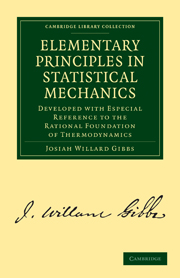 Elementary Principles in Statistical Mechanics
Elementary Principles in Statistical Mechanics Book contents
- Frontmatter
- PREFACE
- Contents
- ELEMENTARY PRINCIPLES IN STATISTICAL MECHANICS
- CHAPTER I GENERAL NOTIONS. THE PRINCIPLE OF CONSERVATION OF EXTENSION-IN-PHASE
- CHAPTER II APPLICATION OF THE PRINCIPLE OF CONSERVATION OF EXTENSION-IN-PHASE TO THE THEORY OF ERRORS
- CHAPTER III APPLICATION OF THE PRINCIPLE OF CONSERVATION OF EXTENSION-IN-PHASE TO THE INTEGRATION OF THE DIFFERENTIAL EQUATIONS OF MOTION
- CHAPTER IV ON THE DISTRIBUTION-IN-PHASE CALLED CANONICAL, IN WHICH THE INDEX OF PROBABILITY IS A LINEAR FUNCTION OF THE ENERGY
- CHAPTER V AVERAGE VALUES IN A CANONICAL ENSEMBLE OF SYSTEMS
- CHAPTER VI EXTENSION-IN-CONFIGURATION AND EXTENSION-IN-VELOCITY
- CHAPTER VII FARTHER DISCUSSION OF AVERAGES IN A CANONICAL ENSEMBLE OF SYSTEMS
- CHAPTER VIII ON CERTAIN IMPORTANT FUNCTIONS OF THE ENERGIES OF A SYSTEM
- CHAPTER IX THE FUNCTION ϕ AND THE CANONICAL DISTRIBUTION
- CHAPTER X ON A DISTRIBUTION IN PHASE CALLED MICROCANONICAL IN WHICH ALL THE SYSTEMS HAVE THE SAME ENERGY
- CHAPTER XI MAXIMUM AND MINIMUM PROPERTIES OF VARIOUS DISTRIBUTIONS IN PHASE
- CHAPTER XII ON THE MOTION OF SYSTEMS AND ENSEMBLES OF SYSTEMS THROUGH LONG PERIODS OF TIME
- CHAPTER XIII EFFECT OF VARIOUS PROCESSES ON AN ENSEMBLE OF SYSTEMS
- CHAPTER XIV DISCUSSION OF THERMODYNAMIC ANALOGIES
CHAPTER XII - ON THE MOTION OF SYSTEMS AND ENSEMBLES OF SYSTEMS THROUGH LONG PERIODS OF TIME
Published online by Cambridge University Press: 05 August 2011
- Frontmatter
- PREFACE
- Contents
- ELEMENTARY PRINCIPLES IN STATISTICAL MECHANICS
- CHAPTER I GENERAL NOTIONS. THE PRINCIPLE OF CONSERVATION OF EXTENSION-IN-PHASE
- CHAPTER II APPLICATION OF THE PRINCIPLE OF CONSERVATION OF EXTENSION-IN-PHASE TO THE THEORY OF ERRORS
- CHAPTER III APPLICATION OF THE PRINCIPLE OF CONSERVATION OF EXTENSION-IN-PHASE TO THE INTEGRATION OF THE DIFFERENTIAL EQUATIONS OF MOTION
- CHAPTER IV ON THE DISTRIBUTION-IN-PHASE CALLED CANONICAL, IN WHICH THE INDEX OF PROBABILITY IS A LINEAR FUNCTION OF THE ENERGY
- CHAPTER V AVERAGE VALUES IN A CANONICAL ENSEMBLE OF SYSTEMS
- CHAPTER VI EXTENSION-IN-CONFIGURATION AND EXTENSION-IN-VELOCITY
- CHAPTER VII FARTHER DISCUSSION OF AVERAGES IN A CANONICAL ENSEMBLE OF SYSTEMS
- CHAPTER VIII ON CERTAIN IMPORTANT FUNCTIONS OF THE ENERGIES OF A SYSTEM
- CHAPTER IX THE FUNCTION ϕ AND THE CANONICAL DISTRIBUTION
- CHAPTER X ON A DISTRIBUTION IN PHASE CALLED MICROCANONICAL IN WHICH ALL THE SYSTEMS HAVE THE SAME ENERGY
- CHAPTER XI MAXIMUM AND MINIMUM PROPERTIES OF VARIOUS DISTRIBUTIONS IN PHASE
- CHAPTER XII ON THE MOTION OF SYSTEMS AND ENSEMBLES OF SYSTEMS THROUGH LONG PERIODS OF TIME
- CHAPTER XIII EFFECT OF VARIOUS PROCESSES ON AN ENSEMBLE OF SYSTEMS
- CHAPTER XIV DISCUSSION OF THERMODYNAMIC ANALOGIES
Summary
An important question which suggests itself in regard to any case of dynamical motion is whether the system considered will return in the course of time to its initial phase, or, if it will not return exactly to that phase, whether it will do so to any required degree of approximation in the course of a sufficiently long time. To be able to give even a partial answer to such questions, we must know something in regard to the dynamical nature of the system. In the following theorem, the only assumption in this respect is such as we have found necessary for the existence of the canonical distribution.
If we imagine an ensemble of identical systems to be distributed with a uniform density throughout any finite extension-in-phase, the number of the systems which leave the extension-in-phase and will not return to it in the course of time is less than any assignable fraction of the whole number; provided, that the total extension-in-phase for the systems considered between two limiting values of the energy is finite, these limiting values being less and greater respectively than any of the energies of the first-mentioned extension-in-phase.
To prove this, we observe that at the moment which we call initial the systems occupy the given extension-in-phase. It is evident that some systems must leave the extension immediately, unless all remain in it forever. Those systems which leave the extension at the first instant, we shall call the front of the ensemble.
- Type
- Chapter
- Information
- Elementary Principles in Statistical MechanicsDeveloped with Especial Reference to the Rational Foundation of Thermodynamics, pp. 139 - 151Publisher: Cambridge University PressPrint publication year: 2010First published in: 1902


